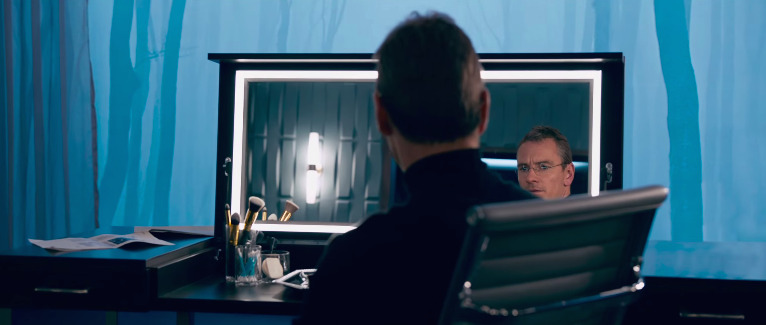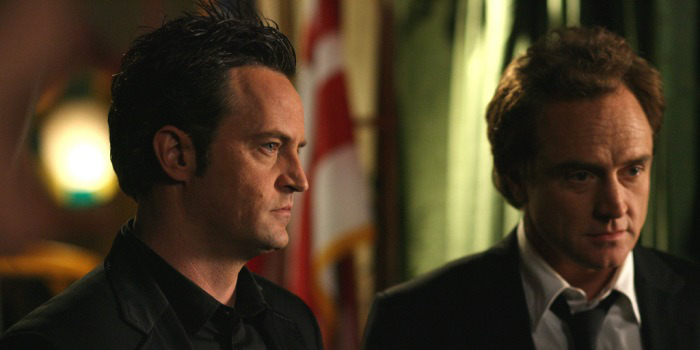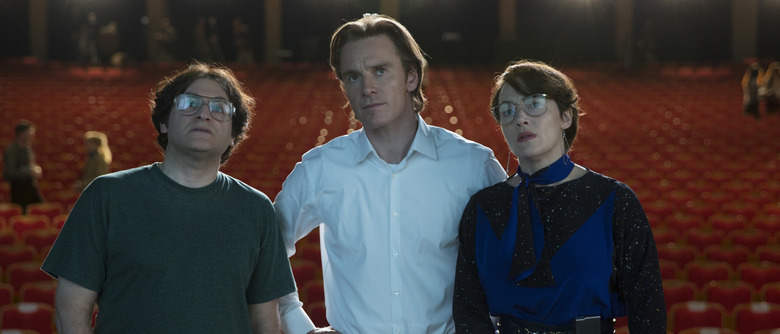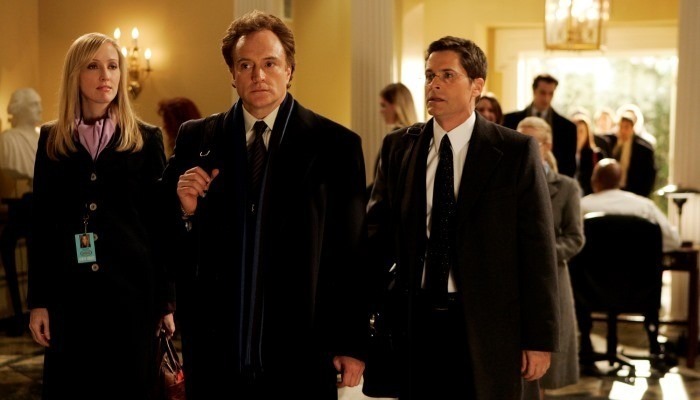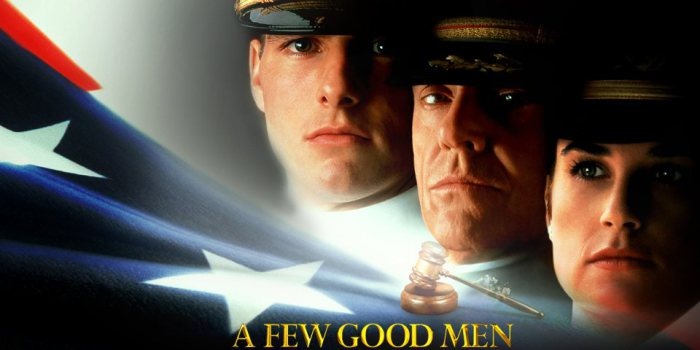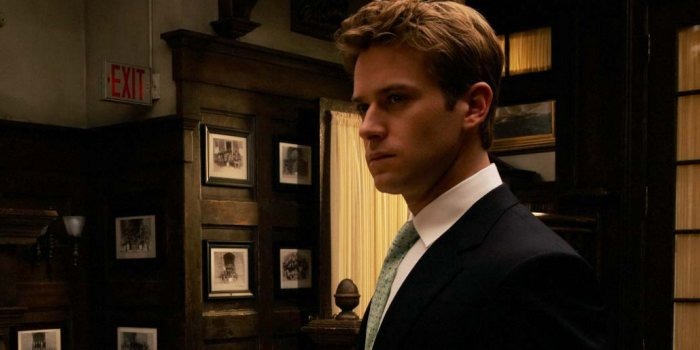Writing Tips From 'Steve Jobs' Screenwriter Aaron Sorkin
I've rarely felt this annoyed in a movie theater. Next to me, during a screening of Steve Jobs, an elderly couple loudly whispers comments to each other every few minutes. With each line of dialogue they distract me from basking in, the more frustrated I grow. I'm afraid to ask them to keep quiet — not because I care how they'll react, but out of fear of missing another line from the movie.
Aaron Sorkin writes anti-bathroom break movies. You don't want to miss a scene or a line of his, especially in the case of his latest piece of work, the breathless, unrelentingly paced, and intricately structured Steve Jobs. By now, such an exciting piece of drama seems like a foregone conclusion from one of Hollywood's most prolific, acclaimed, and all-around successful screenwriters. But past and present interviews with him have revealed not only how he pulls off these feats of genius, but how to start if you're trying to create your own.
After the jump, learn writing tips from Steve Jobs screenwriter Aaron Sorkin.
The writer behind The Social Network and Moneyball got his start in theater, after studying the art form in college, and once even gave acting a shot. He also studied music in college, which shouldn't a surprise considering as there's almost always a musical quality to his dialogue. In fact, he thinks of music while writing.
Want to learn more about screenwriter's process? Here are a few Aaron Sorkin screenwriting tips from interviews and discussions of his from the past:
Throw Your Audience Into the Deep End
"We started at 100 miles an hour in the middle of a conversation [in The Social Network], and that makes the audience have to run to catch up. The worst crime you can commit with an audience is telling them something they already know. We were always running ahead."
The opening of The Social Network shows us everything we need to know about Mark through dialogue, while Moneyball accomplishes that through silence. Sorkin rarely ever begins his stories on the wrong note.
What Does the Protagonist Want?
"There is no one way to [approach character]. Everybody does it differently. For me, rather than tell the audience who the character is, I like to show the audience what a character wants. It all boils down to intentions and obstacles: somebody wants something and something is standing in their way of getting it. They want the girl, they want the money, they want to get to Philadelphia — it doesn't matter, but they have to want it bad. Something formidable is in standing in their way, and the tactics that character uses to overcome the obstacle is going to define who the character is."
Sorkin's characters are always clearly defined. When you think of anything he's written, whether it's the short-lived Studio 60 on the Sunset Strip or one his films, the protagonists' goals immediately come to mind.
Characters Aren't People, Exactly
"The properties of people and the properties of character have almost nothing to do with each other. They really don't. I know it seems like they do, because we look alike, but people don't speak in dialogue. Their lives don't unfold in a series of scenes that form a narrative arc. The rules of drama are very much separate from the properties of life. I think that's especially true of Shakespeare."
There are Aaron Sorkin characters in the real world, but how many people do you actually know who speak as well as Sorkin writes?
Show a Story, Not an Agenda
"The characters I tend to write are going to be quixotic. They're going to fail a lot and fall a lot, but there's a romance in trying for honorable things. I think because of the way I write and some of the subjects I write about — whether something is taking place in the White House or a newsroom — it would be easy to look at that and feel like I'm trying to give you a lecture on 'here's how things should be done,' if everybody just lived the way I wanted them to live, live how the characters are showing as an example. That isn't on my mind at all when I'm writing. I don't have an agenda. I certainly don't have a political agenda."
Whether intentional or not, you could argue that wasn't the case with The Newsroom, a show that wasn't always subtle.
Go Outside, Breathe Some Air, and Open Your Ears
"Frequently if I'm really stuck I'll go out into a public place – a diner, a bus stop, any place you might overhear a conversation. I hope that I can land in the middle of a conversation that will get me thinking, 'What in the world was the beginning of this conversation?' I'll try to write that. I was in a diner once and overheard somebody really frustrated say, 'I mean, honestly, how many people can you think of named Gordon?' I thought, 'I'm going to get out of here and write the rest of this scene, not the beginning of this scene.' I was in Jackson, Mississippi, and passed by a park bench, and two men were sitting there, and one of them said, 'Who thought they were going to get the jump on Jesus?' Again, I thought, 'That's what I'm talking about.' He wrote the best line in the scene, now let me write the rest of it."
How can you understand people if you're sitting in your room all day writing?
Flukes Happen
"Television has a much different relationship with its audience than movies or plays do. It's a much more intimate relationship, because television comes into your home, and it's something you do frequently while you're flipping through a magazine, talking on the phone, putting the kids to bed, or making dinner. The West Wing wasn't supposed to be a hit or even get on the air. It was a fluke it go on the air. It didn't not test well. They let let us make the pilot, and the pilot didn't test well. It didn't test horrendously, but it didn't test through the roof. Then Warner Bros., our studio, in order to convince NBC to put it on their schedule and order 13 episodes of the show, they came up with a new testing sample that no one had tried before. It tested extremely well with four groups — households earning more than $75,000 a year, households where there was someone with four years of college, households that subscribed to the New York Times, households that had home Internet access — and that fourth one was such a big deal because it was right in the middle of the dotcom boom. Warners was able to show NBC where they could advertise."
Sometimes even Aaron Sorkin needs luck.
Just Let the Story Fly
"When it comes to the voice, if I'm consciously doing anything, I'm probably doing something wrong. There needs to come a time when you've got it, know what the scene is about, what needs to happen in the scene, and what the problem is. There does need to come a time when you just have to let it fly. You're lucky to get to that point. If I just wrote genuinely badly, I'll know it, stop, and be upset with myself. If I'm writing the way I write, I'm okay with that."
When people say Steve Jobs is a very Aaron Sorkin-y movie as a criticism, it's hard not to laugh. Of course it's an Aaron Sorkin movie. He wrote it. There's nothing wrong with sticking to your own voice, especially if it's a good one.
Take Fresh Starts, Both On and Off the Page
"I've got plenty of quirks. I go to an office, early in the morning. Early in the morning is really good writing time. I take anywhere between six to eight showers a day. I'm not exaggerating. I'm not a germaphobe, it's all about a fresh start. I was writing, writing, and it's not going well, so start again, take a shower, put on different clothes, and you'll feel refreshed and start again."
Six to eight showers sounds a tad excessive, but it's definitely better than procrastinating online while you have Final Draft open.
Write Like Yourself
"What I'm aware of is sticking to my own voice. I learn a lot from other writers. I'm very easily influenced by other writers. I try to be influenced by the good ones more than the not-so-good ones, but you can be influenced by the not-so-good ones, too, in a bad way. Always when I'm starting something I feel like I need to start it in somebody else's voice. For instance, with The Social Network, I was very aware I was writing for the youngest characters I had ever written for. They alternate between 19 and 25 years old in the movie. I needed to sound youthful somehow. More than that, it was taking place in the 21st century, and I'm not just somebody who's in the 21st century, so I needed to skateboard it or Mountain Dew it up. One, not all 19 year olds speak alike — that's not a language. I'm terrible when I'm trying to write like somebody else, and I tried a page and a half of that, pulled my head off my torso, and put it back on and said, 'You can't write like anybody but yourself.'"
You can also be influenced by the not-so-good writers in a positive way. Obviously Aaron Sorkin knows more about this than I do, but you can learn from mistakes made by other writers.
Go Outside of Your Comfort Zone
"That is a first for me [writing a character who doesn't communicate well with The Social Network]. I tend to write characters who are hyper-communicative. I really admire writers — David Mamet, Sam Shepard, and Harold Pinter — who are able to make absolute poetry out of characters who have difficulty communicating, who are hardly ever saying what they mean; it's a fantastic thing to watch and a fantastic thing to listen to. It's not something I've ever been able to do. My characters tend to use 10 words when one would've sufficed. They say exactly what they mean in all different kinds of ways, and I try to make it fun."
Less is more is generally the case, but not in Aaron Sorkin's world.
Once Again, Stick With Your Voice
"When were doing The West Wing, the hardest thing about doing The West Thing was being compared to yourself. You go out there and want every episode to be as good as your best episode. I wrote 88 episodes of The West Wing, and when you do that, one of them is going to be your 88th best, so your 88th best better be pretty good. There are days where I find myself being more aware than I should that whatever I do next is going to be the thing I did after The Social Network, and it's going to be treated that way. Just deal with it. Just move on. Just stick with your voice. Write as well as you can and move on."
There's plenty to learn from this healthy attitude. Block out all the noise and just do your thing. It's working out pretty well for Aaron Sorkin.


